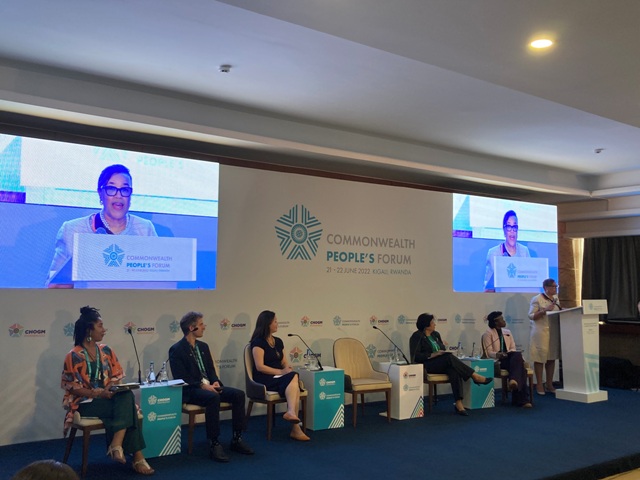 Commonwealth Secretary-General Patricia Scotland addresses the People's Forum. [photo: Victoria Schofield]
Commonwealth Secretary-General Patricia Scotland addresses the People's Forum. [photo: Victoria Schofield]
What with the arrival of HRH Prince Charles and the Duchess of Cornwall in Kigali, the opening of the Business Forum by H.E. Paul Kagame, President of the Republic of Rwanda the closing of the Women’s Forum, not forgetting the People’s Forum, complemented by a plethora of side events, there was a sense of the pace speeding up as we approach the opening ceremony on Friday.
The weather is still gorgeous, the thousand hills, among which Kigali nestles, looking resplendent in the sunshine; I wish I’d had the courage to commandeer a motorbike taxi. Instead I re-established contact with Eric, my first taxi driver, who drove me comfortably around Kigali (which I now understand means ‘wide’ or ‘broad’), always ready to pick me up whenever and wherever I wanted, which has simplified the logistical challenge of CHOGM’s several localities.
Meanwhile, I’d decided to devote my time to the People’s Forum, held in M Hotel, KN1 Avenue, another of Kigali’s luxury hotels taken over by CHOGM for the duration; while climate, health, justice and leadership dominated the first day’s proceedings, governance and freedom of expression formed the core of the People’s Forum on day two.
Yet again the underlying theme to all the discussions was implementation. In the morning the first session on ‘innovations in participatory governance’ was chaired by Dr Linda Yueh, well-known economist, broadcaster and author. ‘What can the Commonwealth do to ensure that the weaker groups are included in participatory governance?’ she asked in the summation, to which panellist Dr Beth Chitekwe-Biti from Zimbabwe and Managing Director of Slum Dwellers International, responded ‘Charity begins at home; if those countries that have transparent systems can use their experience to influence others – there is an opportunity for those who are marginalised to be in the space.’ Sitting at the front in his wheel-chair, Richard Reisner, General Secretary of the Commonwealth Disabled People’s Forum, immediately seized the opportunity to highlight the plight of the disabled in all societies. ‘We need capacity building and democratic structures so that disabled people can play a role.’
‘No one is without agency,’ concluded panellist Dr Sohela Nazneen, a research fellow at the Institute of Development Studies, University of Sussex – her words echoed by Dr Yueh, who highlighted the need for trust. But, she said, there also needs to be accountability. Citing former President Ronald Reagan’s declaration: ‘Trust but verify’, she concluded: ‘We need to build trust but we also need to challenge it.’
Coffee and plentiful cakes sustained us for what to those of us privileged to be operating in the more tolerant ‘global north’, was one of the most important sessions of all the forums: ‘Advancing Freedom of Expression in the Commonwealth’. Jointly moderated and contributed to by Kenyan journalist, Victoria Rubadiri, and Dr Anne Gallagher, AO, Director-General of the Commonwealth Foundation and a member of The Round Table’s editorial board, some uncomfortable truths were revealed. ‘In Ghana we have this saying “You have freedom of speech but you don’t know if you have freedom after speech,”’ proclaimed one audience member. In an age of growing intolerance, the comments of panellist Julfikar Ali Manik, a journalist from Bangladesh, resonated: ‘The sense of insecurity among the people to express themselves is getting deeper and deeper.’ The combination of political and religious differences, business and vested interests emerged as a common deterrent to enabling journalists to write freely in so many countries of the Commonwealth; instead self-censorship crept in when the alternative could be job loss, financial insecurity, even loss of life. ‘Many challenges we face are similar,’ Manik continued. ‘Others are unique to our respective countries.’
On the question of accountability, panellist Dr Sa’eed Husaini, researcher at the university of Lagos, made a telling statement. ‘Within the historical context, there is some hesitance by states in the global south of being held to account by the global north because that seems to evoke colonialism.’ But perhaps, he said, other countries in the global south could ‘shine a light’ on those countries whose systems and practices needed to be highlighted and improved.
As on other days, the lunch break provided an opportunity for the side events; one of the important ones was CommonAge’s focus on the contribution of older people within the context of the People’s Forum theme – ‘Our Planet, Our Health, Our Future’.
Back in our seats punctually for the discussion on ‘A Commonwealth for all’, the Secretary-General, the Rt Hon the Baroness Scotland spoke passionately about inclusivity. ‘We need to hear from everyone. If we are not hearing from them loudly, then we won’t change.’ Alas, despite her encouraging words, I couldn’t help feeling that, as the session continued, I’d heard it all before; and although the Secretary-General had emphasised that the Commonwealth was not the ‘old’ Commonwealth but the ‘new’ Commonwealth, its colonial past once more surfaced, with a discussion about the need for an apology and reparations mingling with upbeat comments about the Commonwealth’s continuing relevance.
With so many facts and figures, experiences and comments of the day’s proceedings reeling in my head, the most startling statistics regarding freedom of expression stayed with me: of the 54 members of the Commonwealth, only thirteen countries are considered ‘open’, twenty-nine obstruct civic space, while twelve were repressive, the ‘elephant in room’ being which those twelve countries were. Relaxation came in the form of the Business Forum’s gala dinner back at the Serena in the presence of the guest of honour, the Prime Minister of Rwanda, Eduoard Ngirente; the highlight was watching (and briefly joining in!) traditional Rwandan dancing. Tomorrow, I plan to face Rwanda’s past.
Next up: guilt and genocide.
Victoria Schofield is the chair of the Round Table editorial board.



